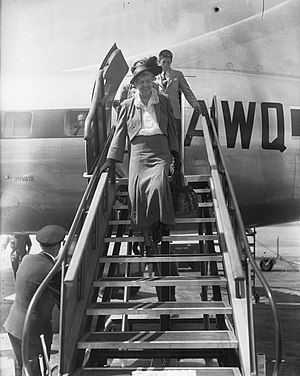1953 Sabena Convair Crash
The 1953 Sabena Convair Crash was the crash of a Convair CV-240 of the Belgian airline Sabena, 3 km north of Frankfurt, Germany, on 14 October 1953. None of the 44 people on board survived the incident.[1]
 Passengers exiting the aircraft involved in the accident in 1950. | |
| Accident | |
|---|---|
| Date | 14 October 1953 |
| Summary | Loss of control after engine failure on takeoff |
| Site | 3 km north of Frankfurt |
| Aircraft | |
| Aircraft type | Convair CV-240 |
| Operator | Sabena |
| Registration | OO-AWQ |
| Flight origin | Salzburg Airport (SZG), Austria |
| Stopover | Frankfurt International Airport (FRA/EDDF), Germany |
| Destination | Brussel-Zaventem Airport (BRU/EBBR), Belgium |
| Occupants | 44 |
| Passengers | 40 |
| Crew | 4 |
| Fatalities | 44 |
| Injuries | 0 |
| Survivors | 0 |
Aircraft
The Convair CV-240-12 involved was built in 1949 with serial number 154 and registration OO-AWQ and was used by the Belgian airline company Sabena from 1 April 1949 until its destruction in 1953.[2][3]
Crash
After having arrived from Salzburg Airport for her stopover, the Sabena flight was scheduled to depart from Frankfurt International Airport bound for Zaventem Airport with 40 passengers and four crew members on board at 15.20 pm on 14 October 1953. However shortly after takeoff, the crew noticed that both engines were losing power. The crew followed the normal procedures and raised the flaps while trying to keep control of their plane. The aircraft ultimately became uncontrollable and stalled, crashing in a wooded area near Kelsterbach about two miles north of the airport she departed from. Firefighters and four ambulances reached the crash scene after following the rising smoke plume but it was quickly discovered that all 44 onboard had perished in the flaming wreckage.[4][5][6]
Probable cause
The cause of the crash was determined to possibly be a heavy deposit of lead on the sparking plugs which reside in the engines. The investigation states that as the plugs warmed up during takeoff, the metal deposits formed a circuit which ended up short circuiting the plugs causing the fatal engine failure and subsequent stalling and crash of the aircraft. It is unknown whether the pilots actions contributed to the crash or if the fatal outcome was unavoidable.[7]
Aftermath
The aircraft was destroyed by the impact and post-crash fire with only pieces of debris scattered around the wooded area. The crash site was documented on film on 21 October by the German press.[1]
References
- "Accident description". aviation-safety.net. 1996. Retrieved 17 July 2020.
- "REGISTRATION DETAILS FOR OO-AWQ (SABENA) CONVAIR CV-240-240-12". planelogger.com. 2015. Retrieved 17 July 2020.
- "1949 Convair 240-12 Liner C/N 154". airport-data.com. 2004. Retrieved 17 July 2020.
- "ACCIDENT DETAILS". planecrashinfo.com. Retrieved 17 July 2020.
- "Plane Crash Kills 40 In Germany". trove.nla.gov.au. Retrieved 17 July 2020.
- "OO-AWQ". skystef.be. Retrieved 17 July 2020.
- "Crash of a Convair CV-240-12 in Frankfurt: 44 killed". baaa-acro.com. Retrieved 17 July 2020.